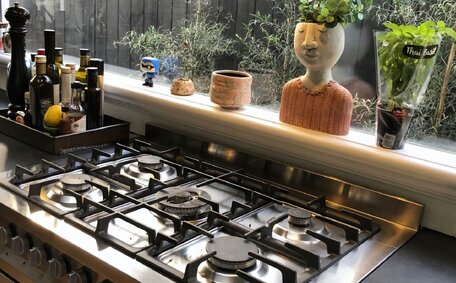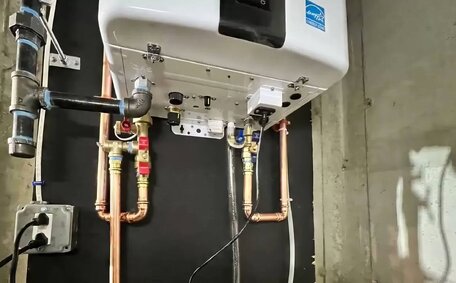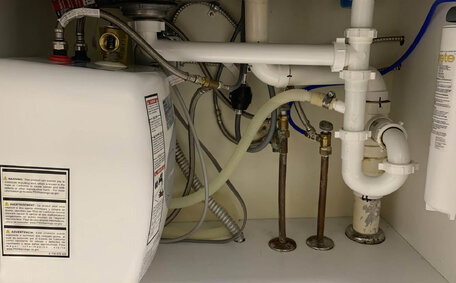Understanding Gas Appliances and Why Proper Disposal Matters
Gas appliances like stoves, hot water systems, and space heaters are common in many Australian homes. While convenient, they can also pose environmental and safety hazards when disposed of improperly after use. As specialists committed to gas safety and knowledgeable in handling gas cylinder disposal as a certified test station servicing the Strathfield area of Sydney, we at Strathfield Plumbing understand the importance of how to properly dispose of older gas appliances.
Old or malfunctioning gas appliances, if disposed of incorrectly, can contaminate landfills, soil, and groundwater with harmful materials and chemicals. Improper handling of gas within tanks, cylinders, and pipes can lead to leakage, explosions, and toxic exposure.
Metal and plastic components unnecessarily fill up landfill space.
The disposal process requires fully closing gas valves and removing any remaining gas. Legally, gas bottles and appliances can be recycled after a licensed gasfitter has safely decommissioned them.
After decommissioning, identifying recycling options is crucial to avoid landfill buildup. Though commercial recyclers may charge a fee, they ensure responsible recycling of gas appliances. If recycling isn’t an option, utilise council collection services for large items or hazardous waste.
In Strathfield, for eco-friendly disposal of your cooker, trust our certified gasfitters to decommission correctly. We’re dedicated to the community’s safety and environmental well-being.
Average Lifespan of Household Gas Appliances
Many Australian households use gas appliances such as:
- Gas stoves and ovens - Average lifespan of a gas stove is 15-20 years.
- Gas space heaters, notably beneficial during colder seasons - Often serve well longer than 8-12 years with meticulous upkeep.
- Gas hot water systems - Expect around 10-15 years of use.
- Gas pool heaters - Can function for 10-15 years with proper maintenance.
The lifespan of a gas appliance relies on usage frequency, conditions, and upkeep. Top-tier models usually surpass the average lifespan, leading to fewer replacements.
Regularly inspect gas appliances and consider disposal if they exceed 5-10 years of operation. Beyond 10-15 years, inefficiency and increased safety risks from worn parts often necessitate replacement or disposal.
What do you do when it’s time and your heater or other gas appliances have been in service for more than 10 years? It’s worth consulting our team at Strathfield Plumbing about replacement options or safe decommissioning and disposal.
Safely Disconnecting and Preparing Old Gas Appliances for Disposal
When getting rid old appliances, safety in handling an ageing gas appliance should be the top priority. You should never underestimate the dangers; improperly disconnected gas appliances that have been sitting unused can cause hazardous fumes to leak and lead to explosions, fires or carbon monoxide poisoning.
You can safely dispose of your gas appliance by following these expert-recommended steps from Strathfield Plumbing for disconnection:
- Turn off your own gas supply at the mains or when using cylinder storage, ensure it’s fully closed.
- Ensure the turn off gas procedure at your pilot lights is thorough, confirming they’re fully extinguished.
- Disconnect and cap any off gas supply lines leading to the appliance.
- When dealing with removable gas canisters, fully separate the gas canister and keep the cylinder upright if it’s not empty, or thoughtfully discard empty gas canisters.
- For permanent fixtures, expel any residual gas from your tank and connected pipes into a safe zone laden with fresh air.
- Take your time to properly detach any electrical connections.
- Remove the appliance for appropriate recycling or disposal through approved channels.
Specialised e-waste services recycle the mechanical components, circuitry, plastics, and metals from gas appliances. Refrigerant gases and insulating materials in gas cylinders and air conditioners need special handling as required by Australian laws.
To disconnect old gas appliances safely, enlist our qualified technicians at Strathfield Plumbing, who take every precaution against leaks, accidents, and environmental damage for your peace of mind.
Recycling and Proper Disposal Options for Old Gas Appliances
At end-of-life, gas appliances require a recycling plan to conserve resources and reduce landfill waste, similar to end-of-life vehicle disposal. Our team at Strathfield Plumbing can facilitate cylinder recycling and safe disposal tailored to your specific appliances and cylinders.
I commit to recycling metal parts such as stainless steel, copper, and brass from gas appliances to support environmental sustainability. Plastics, alongside key refrigerant gases and insulation, are recycled based on their types.
Our recycling process starts with helping you remove your gas appliances, bleeding any residual gas, and detaching elements like valves and regulators. We then remove your butane canister from your home and help load them for drop-off at approved recycling centres that handle gas appliances and cylinders.
Options such as council cleanups, scrap metal dealers, and waste collectors assist with gas and white goods disposal. Consult your local council or waste management services for details. Charities might collect functional small appliances, turning your donation into a benefit for others.
As your local experts in Strathfield, Sydney, our team ensure you see they are disposed of and recycled with the highest regard for safety. We ensure you see they are safely decommissioned, transported, and environmentally-soundly recycled on your behalf. Feel free to enquire during your subsequent visit or give us call for detailed explanations.
Drop-Off Locations and Take-Back Schemes for Gas Appliances
Following the proper decommissioning of your gas appliances, various disposal and recycling options are available in your locality:
- Strathfield Council holds quarterly E-Waste collections for items such as batteries and mobile phones, facilitating safe disposal. It’s worth checking your local waste calendar for the next event.
- The Summer Hill Waste Management Centre runs a Community Recycling Centre accepting appliances in good working condition for resale or metal recycling.
- Sims E-Recycling accepts most household appliances at their waste facility in Marrickville.
- Some retailers like The Good Guys run take-back schemes when you purchase a new gas cooker - check their policies online.
For assistance with transport and disposal recycling of larger appliances, contact us at Strathfield Plumbing. We ensure correct drop-off at approved centres and adherence to hazardous materials regulations. Reach out for more on recycling options or removal quotes.
Navigating Local Regulations and Programs for Gas Appliance Disposal
When it comes to recycling or disposing of gas appliances in New South Wales, there are important regulations to follow for safety and compliance reasons. The NSW Environment Protection Authority provides guidance, as do local councils like Strathfield Council.
In NSW, a licensed professional like our Strathfield Plumbing team is required to safely dispose of gas from appliances due to the associated health risks. We decommission items properly before disposal while preventing leaks or accidents. There are also rules around transporting hazardous materials that we adhere to fully.
Recycling old fridges, air conditioners and other gas appliances containing refrigerants is now mandatory in NSW. Specialist handling of these ozone-depleting substances is critical and best left to qualified technicians. Programmes like the NSW Refrigerant Reclaim Scheme help facilitate proper recovery and recycling of your items.
NSW’s Household Chemical CleanOut events offer numerous opportunities for responsible disposal of hazardous items, complementing general recycling efforts. These options guarantee that household appliances and chemicals, including gas cylinders, are responsibly disposed of in safe hands. Strathfield Council also functions as a removal company by assisting residents with regular e-waste collections.
If you have queries regarding disposal locations for your old appliances or need advice on local regulations, our team at Strathfield Plumbing can assist. We’re current with all gasfitting regulations and dedicated to safe, lawful, and eco-conscious disposal within Strathfield.
Environmental Considerations When Disposing of Gas Appliances
Responsible disposal of end-of-life gas appliances, such as fridges, ovens, and heaters, is key to reducing environmental harm. The hazardous materials they contain require careful management to avoid landfill pollution.
Refrigerants like CFCs and HCFCs damage the ozone layer and have global warming impacts hundreds to thousands of times more potent than carbon dioxide. Even minor leaks from a disposed gas appliance subjected to direct sunlight over time contribute to climate change.
Insulation materials also don’t decompose properly in landfills. And metals like lead and mercury can contaminate soil and groundwater, illustrating the critical need to dispose old gas appliances and metals properly to prevent such leaks.
Strathfield Plumbing prioritises responsible gas appliance disposal. We meticulously decommission and recycle appliances, preventing harmful emissions and materials from contaminating landfills, and manage the safe handling of ozone-depleting refrigerants.
According to regulations, only certified gasfitters should remove or handle gas appliances to mitigate leak risks. For eco-compliant disposal in Strathfield, Sydney, trust our experts who employ best practices to minimise the environmental impact of old gas equipment.
Troubleshooting Challenges and Concerns with Gas Appliance Disposal
Disposal of old gas appliances presents challenges such as finding drop-off centres for hazardous materials, especially for bulky items, and safely managing dangerous gases and materials.
We advise contacting a professional gasfitter like Strathfield Plumbing who can do the safe disposal of old appliances through proper decommissioning, gas removal, transport, and disposal. Our licenced technicians can help ensure appropriate materials separation and recycling while preventing pollution or injury.
Concerns over disposal costs, compliance, and convenience should not lead to irresponsible abandonment of appliances. Our clear quotes address concerns about additional fees—without surprises. We oversee the entire disposal procedure, maintaining legal and environmental standards.
Our team is available to provide direct assistance and guidance on the disposal of your gas appliances.






